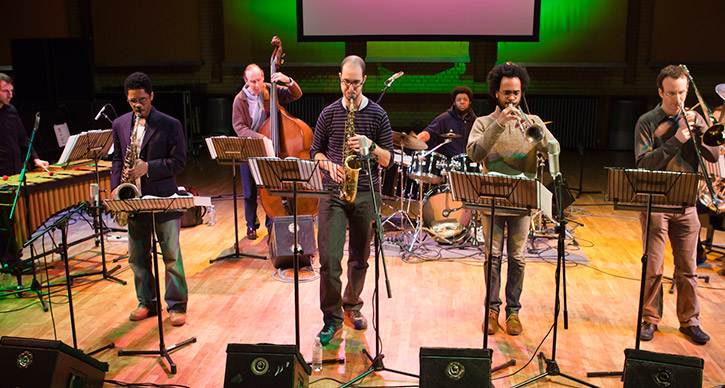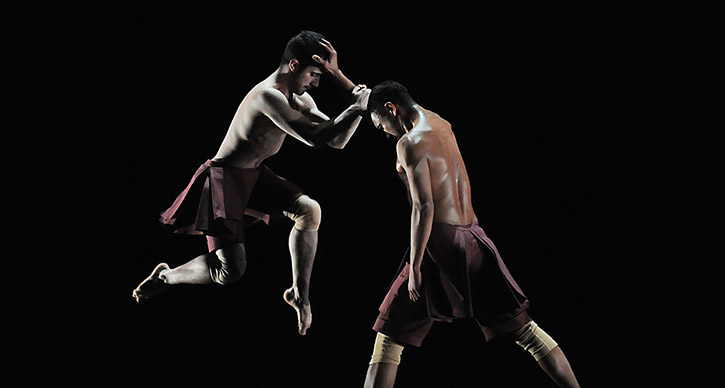Behind the Scenes with Steve Lehman
This post is a part of a series of playlists curated by UMS artists. Check out more artist-curated music here.

Photo: Steve Lehman performs (center).
UMS: We’re so excited for your performance in Ann Arbor on November 9. Can you tell our audience a little about the music that you’ve been listening to lately?
Steve Lehman: It’s been a lot of fun composing a new book of music for this amazing group of musicians. This time around, I’ve been working with a specially-tuned vibraphone, live electronics, and the music of Bud Powell, in an effort to create new musical environments for this ensemble of daredevil improvisers. When I’m composing, I’m always on the look out for inspiration in the domains of timbre, harmony, rhythm, and compositional form. Here’s a list of some of my current favorites.
What did you think about the playlist? Share your thoughts in the comments below.
Renegade Artists in 2013-2014

Photo: From “And then, one thousand years of peace” by Ballet Preljocaj. Photo by JC Carbonne.
Artists engage daily in a creative enterprise full of risk-taking, experimentation, and boundary pushing. Renegade is about artists who, in their own time and context, draw outside the lines, changing our expectations.
Complicite & Setagaya Public Theater: Shun-kin – September 18-21
With director Simon McBurney, you can expect the full box of theatrical tools — text, music, imagery, and action — put in service to big ideas that create surprise, confusion, and disruption. The result is anything but an expected night in the theater. These are experiences which last a lifetime. (Michael Kondziolka, UMS Director of Programming) Learn more
Ballet Preljocaj – November 1-2
Dance-theater (tanztheater), a 20th-century invention primarily attributed to the German expressionists, pushed audiences’ expectations about what a dance would look like, intentionally distancing itself from the traditions of classical ballet. Its aspiration: that, through dance, all artistic media would be united and achieve an all-embracing, radical change in humankind. Angelin Preljocaj’s work lives within and expands this experimental lineage. (Michael Kondziolka, UMS Director of Programming) Learn more
Steve Lehman Octet – November 9
Composer and saxophonist Steve Lehman is trailblazing new computer-driven models for improvisation, resulting in striking new harmonies. With his Octet, Lehman has achieved the first fully realized exploration of spectral armony in the history of recorded jazz. (Mark Jacobson, UMS Senior Programming Manager) Learn more
Colin Stetson – January 15-16
Colin Stetson, who performs unbroken 10-minute-plus compositions for unaccompanied bass and alto saxophones via a combination of circular breathing, overtones, and amplified vocalizations, expands the boundaries of what was previously thought possible for solo performance. (Mark Jacobson, UMS Senior Programming Manager) Learn more
Kronos Quartet – January 17-18
For nearly 40 years, the Kronos Quartet has pursued a singular artistic vision, combining a spirit of fearless exploration with a commitment to continually re-imagine the string quartet experience. They started out as classical chamber music’s original renegades and continue that cause to this very day. Two different programs explore their take on 40 years of renegade music-making, anchored by the piece where it all began — George Crumb’s Black Angels, a highly unorthodox, Vietnam War-inspired work featuring bowed water glasses, spoken word passages, and electronic effects. (Michael Kondziolka, UMS Director of Programming) Learn more
Kremerata Baltica and Shostakovich – February 6
With Kremerata Baltica and Gidon Kremer
It is hard for any of us to imagine what it means to be denounced publicly by the highest officials of one’s own government — especially during a time when everyone pretty much understood that this kind of admonishment could lead to a life of hard labor or worse. Dmitri Shostakovich not only carried on, but continued to create a body of art that pushed right back, albeit in coded and subversive ways. As a composer, he worked within an expected tradition; as a human, he raged against all manner of censorship and injustice. Shostakovich’s Anti-formalist Gallery was a dangerously satirical cantata never intended to be published or performed, as it would have imperiled his safety. During the composer’s lifetime, the work was performed only for family and close friends; it did not receive its first public performance until January 1989, 14 years after his death. (Michael Kondziolka, UMS Director of Programming) Learn more
Who are your favorite “renegade” artists or performers? Which performances from this list are you excited to see?


